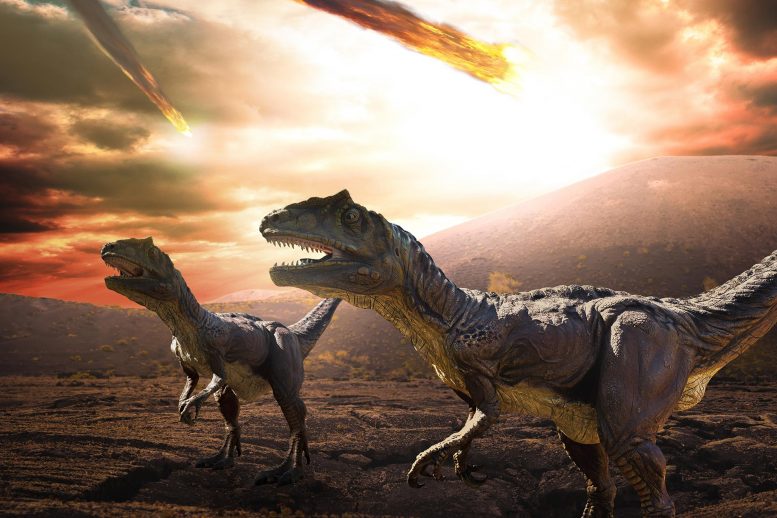
A new study provides the strongest evidence yet that the dinosaurs were struck down in their prime and were not in decline, at the time the asteroid hit.
Landmark study reveals that dinosaurs dominated the world right up until a deadly asteroid hit Earth, leading to their mass extinction, around 66 million years ago.
The findings, which were published in the journal Science Advances on December 7, provide the strongest evidence yet that dinosaurs were struck down in their prime. At the time the Chicxulub asteroid hit, dinosaurs were not in decline.
Scientists have long debated why non-bird dinosaurs, including Tyrannosaurus rex and Triceratops, became extinct – whereas mammals and other species such as turtles and crocodiles survived.
“Dinosaurs were going strong, with stable ecosystems, right until the asteroid suddenly killed them off..” — Professor Steve Brusatte
Led by an international team of paleontologists and ecologists, the study analyzed 1,600 fossil records from North America. Researchers modeled the food chains and ecological habitats of land-living and freshwater animals during the last several million years of the Cretaceous, and the first few million years of the Paleogene period, after the asteroid hit.
For some time paleontologists have known that many small mammals lived alongside the dinosaurs. However, this research reveals that these mammals were diversifying their diets, adapting to their environments, and becoming more important components of ecosystems as the Cretaceous unfolded. Meanwhile, the dinosaurs were entrenched in stable niches to which they were supremely well adapted.
Mammals didn’t just take advantage of the dinosaurs dying, experts say. They were creating their own advantages through diversifying – by occupying new ecological niches, evolving more varied diets and behaviors, and enduring small shifts in climate, by rapidly adapting. These behaviors probably helped them to survive, as they were better able than the dinosaurs to cope with the radical and abrupt destruction caused by the asteroid.
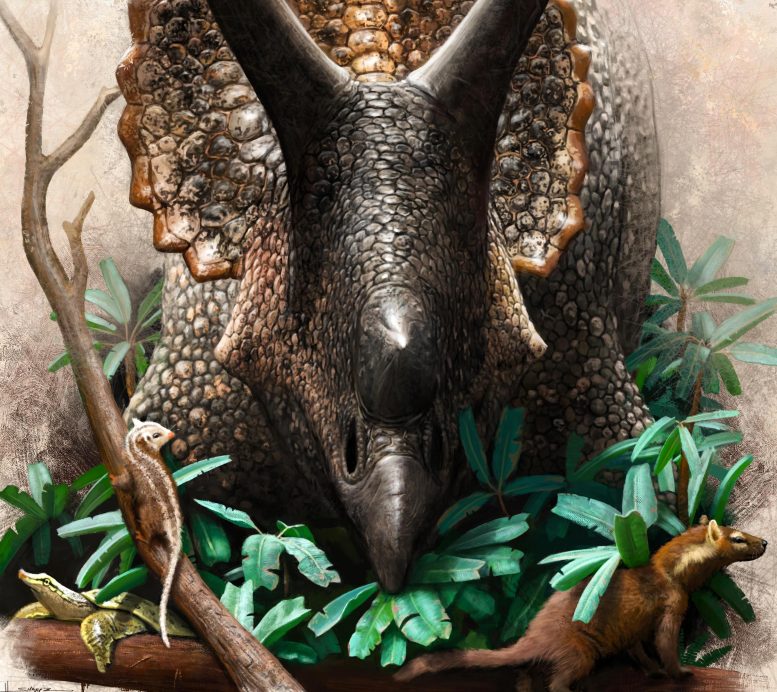
Triceratops prorsus munching on cycads disturbs primitive cousins of placental (left) and marsupial (right) mammals in the underbrush- while a softshell turtle climbs up on a log, unaware that its freshwater ecology will shelter it from the impending doom from space. Credit: Henry Sharpe
First author, Jorge García-Girón, Geography Research Unit, University of Oulu, Finland and Department of Biodiversity and Environmental Management, University of León, Spain, said: “Our study provides a compelling picture of the ecological structure, food webs, and niches of the last dinosaur-dominated ecosystems of the Cretaceous period and the first mammal-dominated ecosystems after the asteroid hit. This helps us to understand one of the age-old mysteries of paleontology: why all the non-bird dinosaurs died, but birds and mammals endured.”
Co-lead author, Alfio Alessandro Chiarenza, Department of Ecology and Animal Biology, University of Vigo, Spain, said: “It seems that the stable ecology of the last dinosaurs actually hindered their survival in the wake of the asteroid impact, which abruptly changed the ecological rules of the time. Conversely, some birds, mammals, crocodilians, and turtles had previously been better adapted to unstable and rapid shifts in their environments, which might have made them better able to survive when things suddenly went bad when the asteroid hit.”
Senior author, Professor Steve Brusatte, Personal Chair of Palaeontology and Evolution, School of GeoSciences, University of Edinburgh, said: “Dinosaurs were going strong, with stable ecosystems, right until the asteroid suddenly killed them off. Meanwhile, mammals were diversifying their diets, ecologies, and behaviors while dinosaurs were still alive. So it wasn’t simply that mammals took advantage of the dinosaurs dying, but they were making their own advantages, which ecologically preadapted them to survive the extinction and move into niches left vacant by the dead dinosaurs.”
Reference: “Shifts in food webs and niche stability shaped survivorship and extinction at the end-Cretaceous” by Jorge García-Girón, Alfio Alessandro Chiarenza, Janne Alahuhta, David G. DeMar, Jani Heino, Philip D. Mannion, Thomas E. Williamson, Gregory P. Wilson Mantilla and Stephen L. Brusatte, 7 December 2022, Science Advances.
DOI: 10.1126/sciadv.add5040
The research is published in the journal Science Advances. It was funded by National Science Foundation (USA), Academy of Finland, European Union Next Generation European Research Council (ERC) Starting Grant, European Union’s Horizon 2020 Research and Innovation Programme, Juan de la Cierva Formación 2020 Fellowship funded by the Ministry of Science and Innovation from the European Union Next Generation.

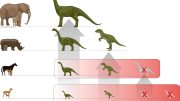
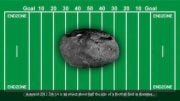
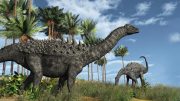
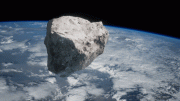
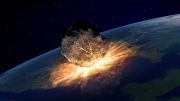
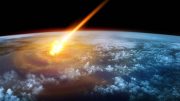
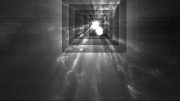
T-REX in their PRIME… Recent research indicates that SOME FEW may have ACTUALLY Survived! Most, it is believed, have had state-of-the-art Dental Implants 😁 and currently comprise the Top Ten traders in Stocks, Bonds and Metals Markets.
But don’t quote me. Rumor has it that their hearing is quite ACUTE.
🦖🦖🦖
ARRRGGGG
T-REX in their PRIME… Recent research indicates that SOME FEW may have ACTUALLY Survived! Most, it is believed, have had state-of-the-art Dental Implants 😁 and currently comprise the Top Ten traders in Stocks, Bonds and Metals Markets.
But don’t quote me. Rumor has it that their hearing is quite ACUTE.
🦖🦖🦖
ARRRGGGG!
I am very intrigued by the dinosaurs and what has survived of the dinos and such after asteroid hit Earth,that killed off the dinosaurs. This all is very interesting…
To Alfio Alessandro Chiarenza, the article has some intriguing insights, but, the ‘base data’ is all wrong, which in turn diminishes the article.
There is too much evidence to describe on this forum, but, your article doesn’t take into account:- A collision event shifting the Earth into a new orbit, closer to the Sun.
:- The mega-tonnes of ejecta thrown into the air.
:- The composition of that ejecta, being all manner of mud,rock,flora and fauna.
:- The realisation that the ejecta then falls back to Earth, but could be thousands of kilometres away from origin.
:- The collision event was ‘a mixing’ (like a gigantic chemical reaction) of two planets, each with their own original ecosystem and timeline.
So Cretaceous and Paleozoic, tho thought to be separate periods in time are actually closer to mixing two colours of play-doh.
Cheers Steve Jeffs.
Alligator is the won that kill off the dinosaur not the asteroid because it’s a spinosauridae the king dinosaur modern crocodilian are amazing predator mesoeucrocodylia live tyrannosaur live.dinosaur are too great so they turn into a gator the death roll is the greatest dinosaur technology it was first found in spinosauridae the fully secondary bony palate is no joke toooooo
Dinosaur are still making advantage guest they do not know about death roll system they are million gator around today gator match up well against mammal because it’s a high tech mammal type of reptile the reptile version of a cat .how I am going take this story serious clearly they know nothing about the gator the greatest dinosaur every live .the none bird dinosaur is this a joke gator link with birds I give you a clue gator do not have orbitalosphenoid like the oviraptor bird and the chicken bird.spinosauridae is a fully form mesoeucrocodylia the first death roll dinosaur .